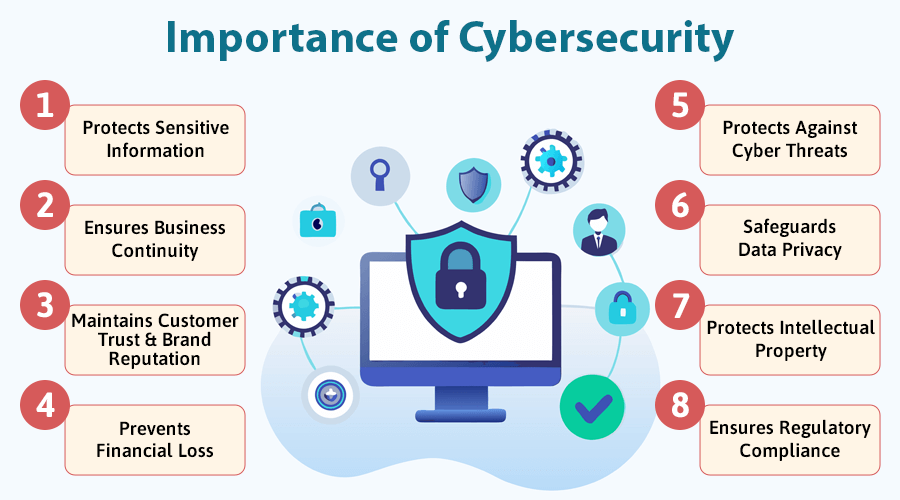Introduction to Cybersecurity in the Digital Age
Cybersecurity is crucial in safeguarding data, systems, and personal information from various cyber threats. As technology grows rapidly, individuals and businesses face increasing cyberattack risks, including phishing, ransomware, and data breaches. Understanding the importance of cybersecurity is essential to keep digital information safe, private, and accessible. It ensures smooth business operations and maintains trust among customers. With more devices connecting online, the demand for robust cybersecurity measures has never been greater.
Understanding Cybersecurity
Cybersecurity means defending computers, servers, mobile devices, networks, and data from malicious attacks. It is an essential component of our digital world, where threats like phishing, malware, and data breaches are increasingly common.
How Cybersecurity Works?
Cybersecurity uses several layers of protection to keep information and systems safe from unauthorized access. Key components include:
- Firewalls: They act as a shield between safe and potentially unsafe networks.
- Antivirus Software: Detects and removes malicious software.
- Encryption: Protects data by converting it into a coded format.
- User Authentication: Allows access only to authorized users.
While technology is crucial, understanding best practices to minimize risks is equally important. Joining a cybersecurity course can help individuals gain the skills to apply strong security measures and keep up with current trends and threats. For instance, learning frameworks like SLAM in cybersecurity courses can provide deeper insights into proactive threat detection and real-time defense strategies.
Importance of Cybersecurity
As our personal and professional lives move online, the risk of cyberattacks grows exponentially. Here is some importance of cybersecurity:
- Protects Sensitive Information: Cybersecurity safeguards personal and corporate data from unauthorized access, ensuring that sensitive information remains secure.
- Ensures Business Continuity: Cybersecurity keeps businesses operational by defending against potential disruptions, even in the face of cyber threats.
- Maintains Customer Trust and Brand Reputation: Proper cybersecurity practices protect customer data, fostering trust and loyalty, which are crucial for a strong brand reputation.
- Prevents Financial Loss: Cybersecurity helps mitigate the financial damages associated with data breaches, fraud, and system outages, which can be costly.
- Protects Against Cyber Threats: It protects against threats such as phishing, ransomware, and malware, which can cause system disruptions and data loss.
- Safeguards Data Privacy: Cybersecurity guarantees the confidentiality of sensitive data, whether personal or business-related, keeping it out of unauthorized hands.
- Protects Intellectual Property: Companies rely on cybersecurity to prevent intellectual property theft, ensuring their competitive advantage remains intact.
- Ensures Regulatory Compliance: Many industries have strict data protection rules, and strong cybersecurity helps meet these standards, preventing penalties and legal problems.
How to Gain Expert Knowledge in Cybersecurity?
Obtaining expertise in cybersecurity is essential to build a secure future in the digital age. As cyber threats grow more sophisticated, continuous learning is crucial. Key steps to gain knowledge include:
- Master Network Security: Understanding the fundamentals of protecting networks.
- Learn Encryption Techniques: Familiarity with methods to secure data.
- Study Ethical Hacking: Understanding how hackers think to better defend against them.
Enrolling in an IIT cybersecurity course can provide a comprehensive learning experience. These courses, designed by industry experts, cover essential aspects of cybersecurity, from fundamentals to advanced practices. The combination of theoretical knowledge, hands-on lab work, and exposure to real-world cyber challenges equips learners to secure digital environments confidently.
Final Thoughts
The importance of cybersecurity cannot be exaggerated. As individuals and businesses increasingly depend on digital platforms, protecting sensitive information from cyber threats has become important. Effective cybersecurity ensures data privacy, maintains trust, and protects against financial losses.
We can safeguard our digital lives from evolving threats by staying informed, implementing strong security measures, and embracing a proactive approach. In a world where cyberattacks are becoming more sophisticated, the potential consequences of not prioritizing cybersecurity are threatening. It is essential for creating a secure digital environment for individuals, businesses, and communities to succeed. The future depends on how well we protect our data.
Recommended Articles
We hope this article has highlighted the importance of cybersecurity in the digital era. Check out these recommended articles for more insights on enhancing your cybersecurity practices and protecting your digital assets.


